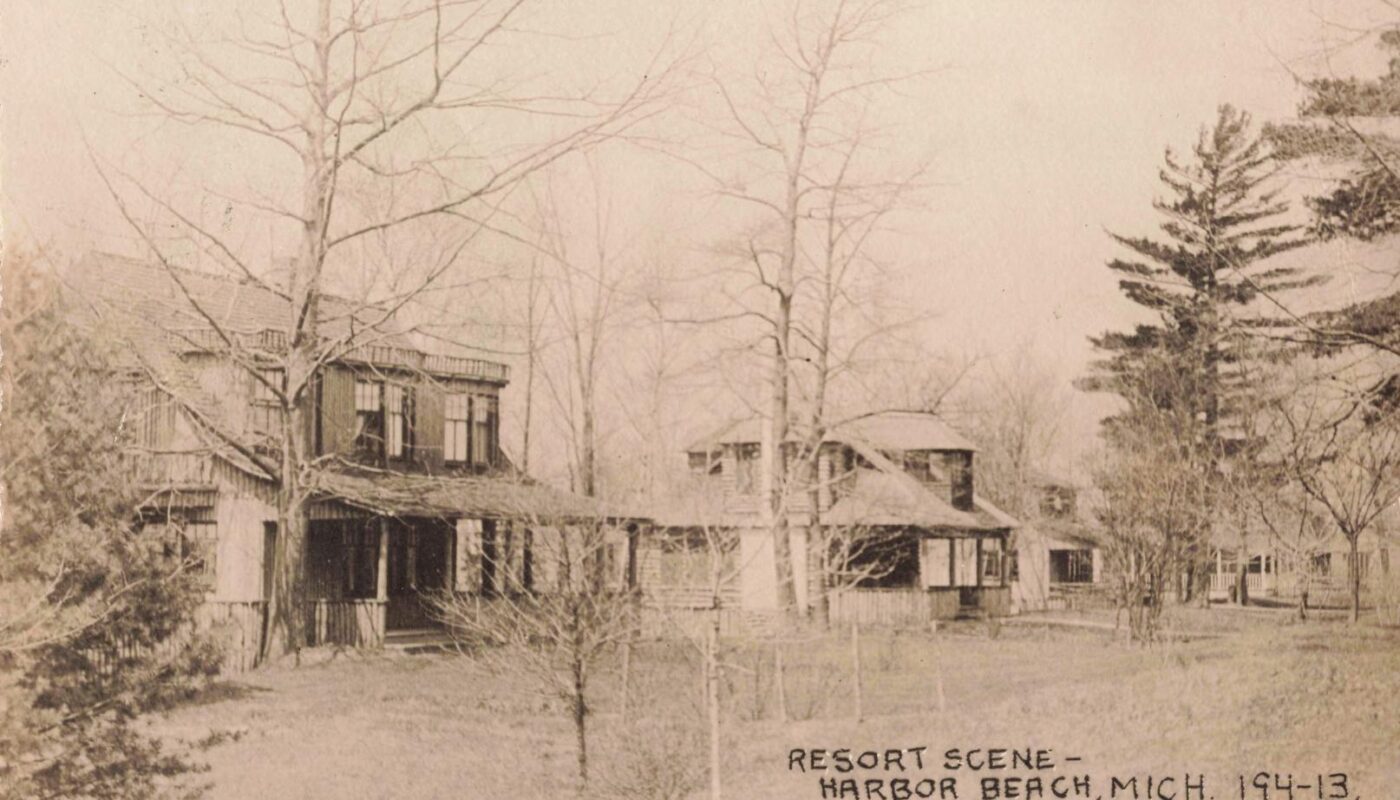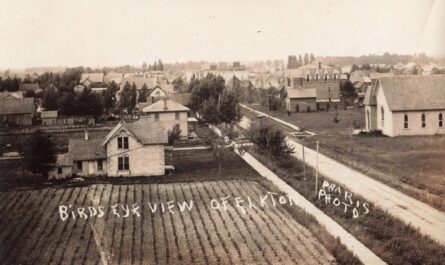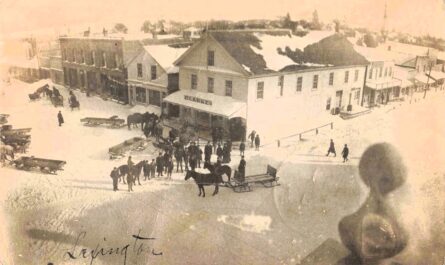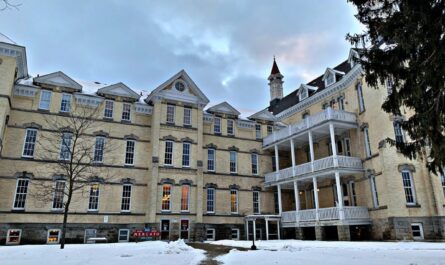Nestled along the tranquil shores of Lake Huron, three resort communities have stood as iconic summer retreats since their establishment in the late 1800s. Celebrated for their rustic charm, exclusive membership, and rich traditions, these resorts continue to provide families with a timeless escape, blending historic elegance with modern amenities. Harbor Beach Resort, along with Pointe aux Barques and Les Cheneaux Club, represents the enduring tradition of private resort communities in Michigan, each notable for their unique heritage and exclusive atmosphere.
Table of Contents
Harbor Beach Resort Association
Harbor Beach Resort Association in Harbor Beach, Michigan, is a historic private summer resort community founded in 1896. It began as a collection of rustic cottages established by Midwestern families seeking relief from the city heat along Lake Huron?. The resort sits along a one-mile stretch of lakeshore and originally featured log and wood-shingle cottages in a wooded setting.. Over a century later, the community remains active – many original cottages are still in use, and descendants of early members continue the tradition of vacationing there each summer.
Unique Features of the Harbor Beach Resort
Harbor Beach Resort Association has maintained much of its old-fashioned charm while offering a range of amenities for members:
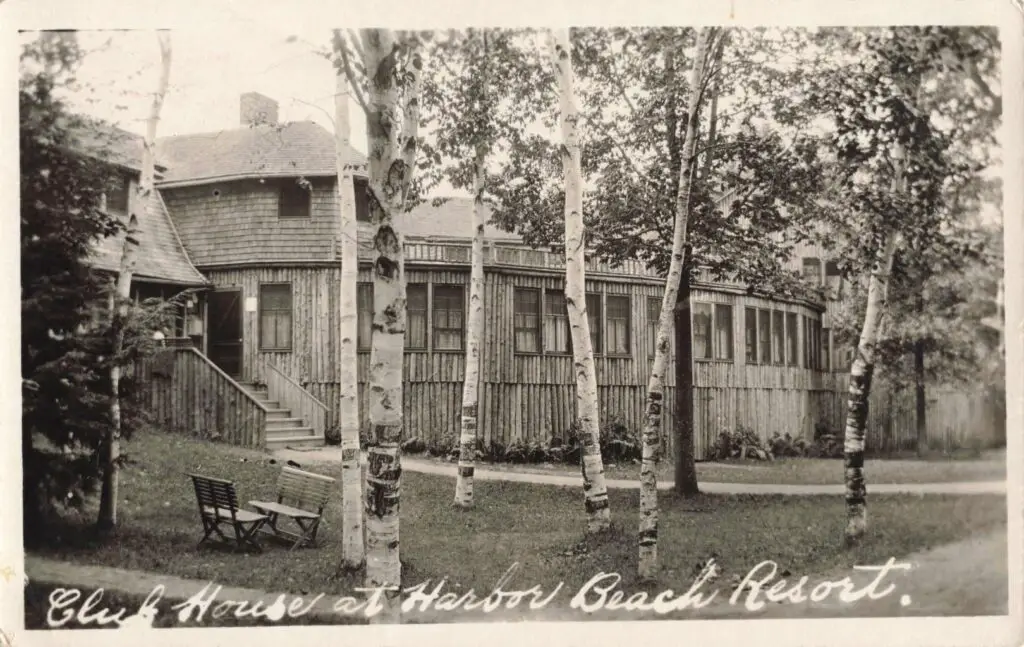
A historic clubhouse serves as the social hub, with a communal dining hall where meals are prepared by staff chefs. Traditionally, breakfast, lunch, and dinner are served to members three times a day, five days a week (with limited service on Wednesdays and Sundays) in this shared dining room. This practice of gathering for regular group meals is a unique hallmark of the resort’s community life.
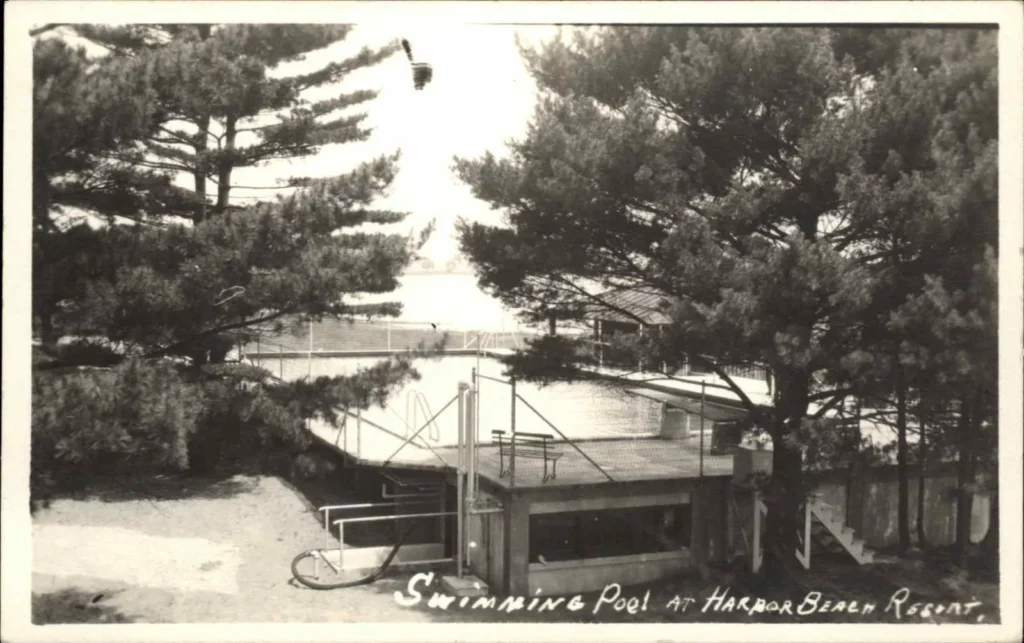
The grounds include recreational facilities such as a private 9-hole golf course, tennis courts, a swimming pool, and a waterfront party hall for social events.The resort’s Lake Huron beachfront provides swimming and boating opportunities, and members enjoy panoramic views of the Harbor Beach Lighthouse just offshore. Notably, the association even arranges access to the historic lighthouse’s interior for tours.
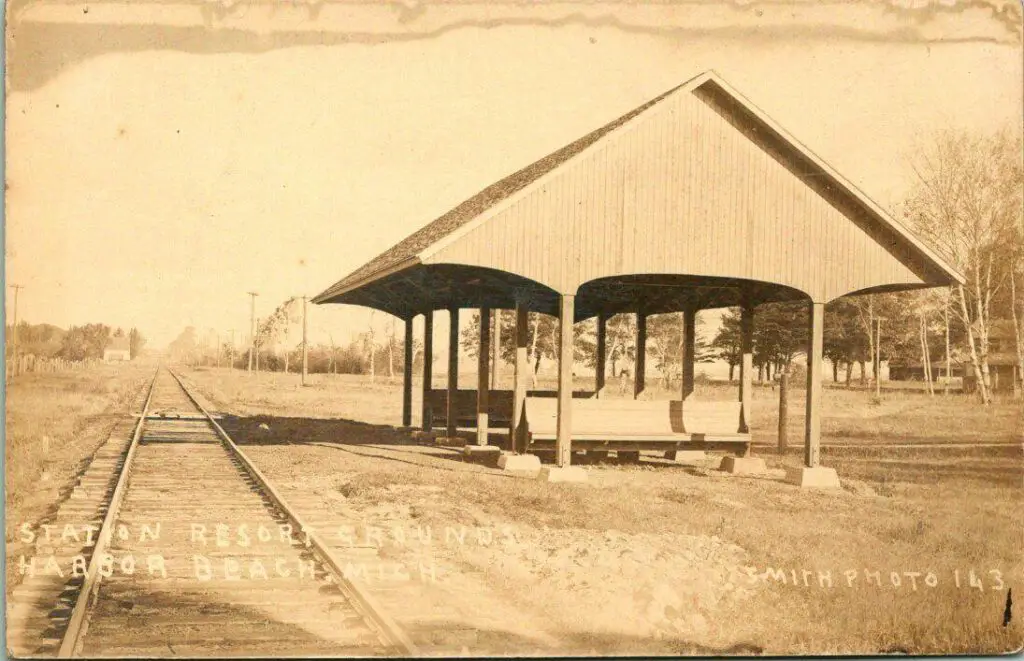
In its early days, the resort was so prominent that it had its own railroad depot on the property. In the late 19th century, the Port Huron and Northwestern (later Pere Marquette) Railroad built a special passenger station at Harbor Beach Resort Association to conveniently bring guests directly to the retreat. This private depot underscores the resort’s popularity among affluent travelers of the era.
Harbor Beach Resort Association’s Notable Members
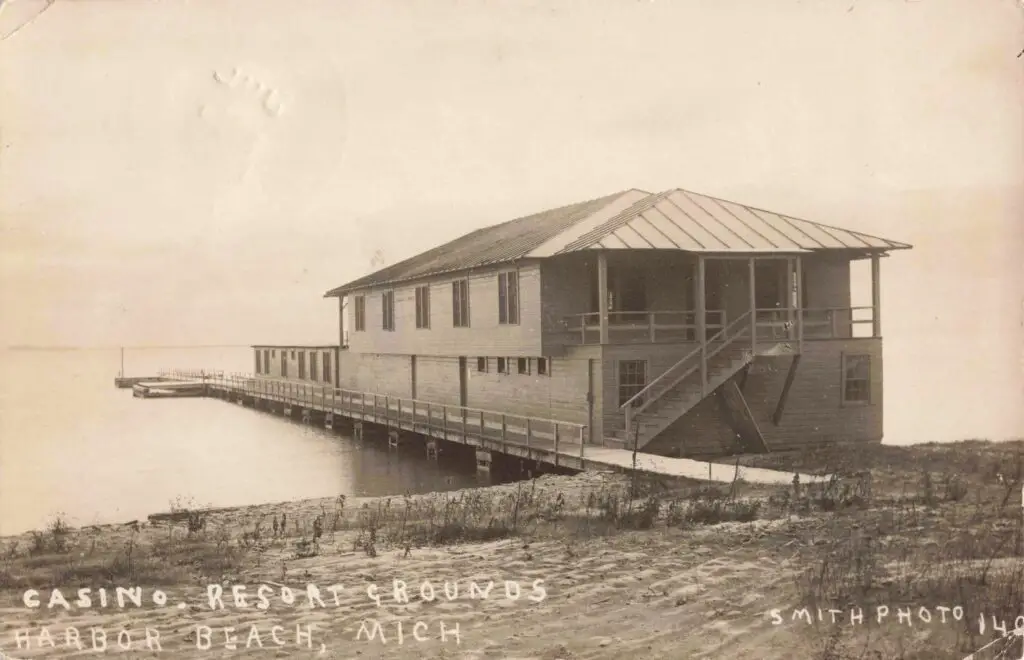
Harbor Beach Resort Association has always been an invite-only enclave. Many members’ families have been coming for generations, forging a close-knit, multigenerational community. Historically, resort “cottagers” included prominent Midwest business families (often from Detroit and other cities) who spent summers here to escape urban life. While specific famous individuals from Harbor Beach are less documented than some other resorts, its significance lies in its cultural continuity – it exemplifies the turn-of-the-century pattern of Michigan’s elite forming private lakeshore colonies.
Appealing to a New Generation
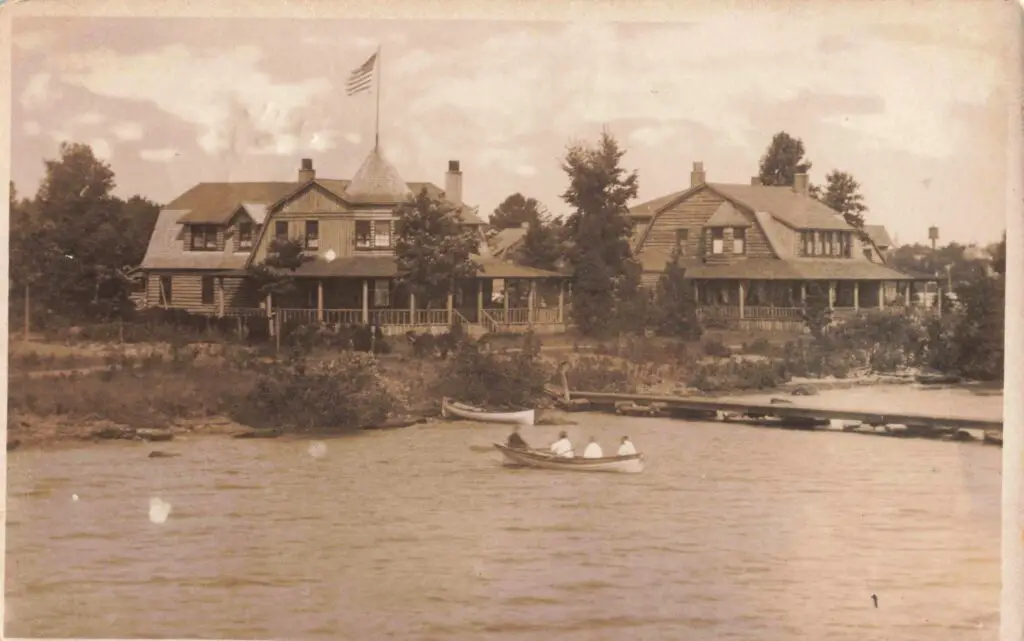
The original clubhouse (a focal point since the 1890s) burned down in the 2000s but was carefully rebuilt as an almost replica to preserve the traditional look. Today, the association remains private and operational, run by member families. Membership is essentially limited to those who own one of the ~42 cottages on the property. New members usually join only when a cottage changes hands – often, sales require board approval or family succession, keeping the community exclusive and insular. Despite modern updates, the Harbor Beach Resort Association stays true to its historic roots as a family-oriented summer retreat, with a “camp meeting” atmosphere and shared experiences that have changed little since its founding.
Pointe aux Barques Cottage Community (Huron County, Michigan)
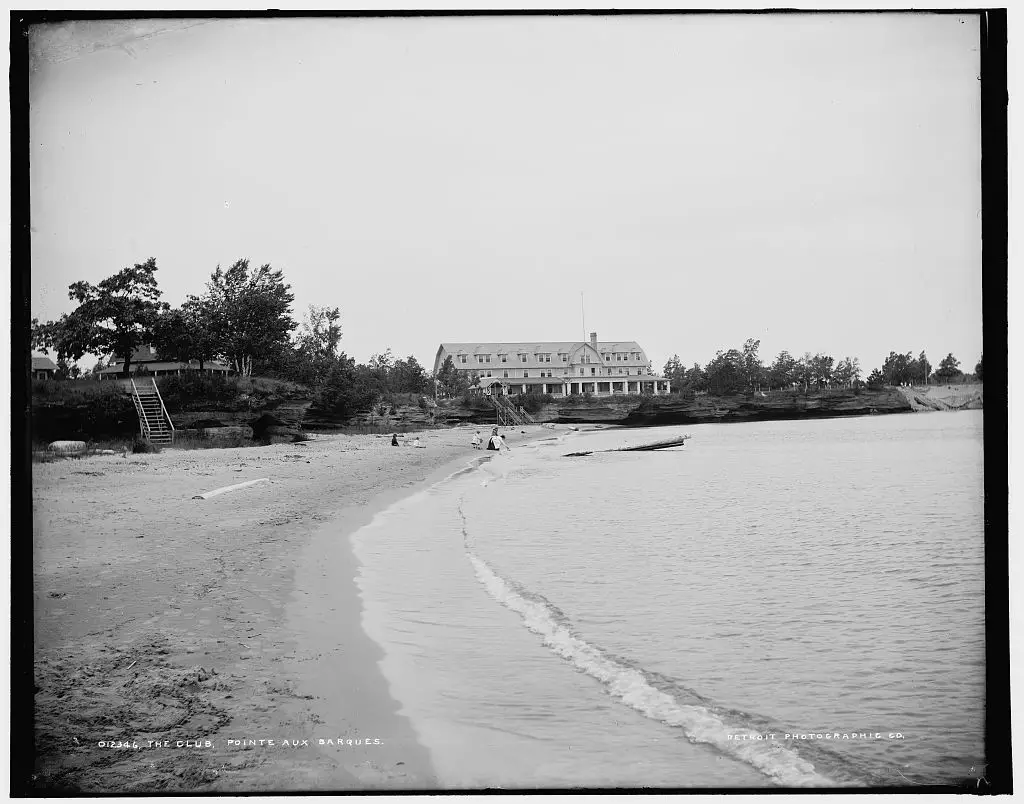
Located at the tip of Michigan’s “Thumb” along Lake Huron, the Pointe aux Barques cottage community is another private resort with a storied past. Its modern history dates to the late 1890s – Stanford Crapo, a Pere Marquette Railroad executive, recognized the potential of the beautiful Pointe aux Barques area as a summer haven for Detroit’s social elite. A post office was established there in 1897 as the remote settlement grew. By the early 1900s, Pointe aux Barques had developed into an exclusive resort colony. The Pere Marquette Railroad ran special club cars twice daily during summers to bring guests up from Detroit. In 1912, the community planned to open a grand resort hotel (with advertised room-and-board rates of $14 per week) – although, tragically, the hotel building burned down just before opening. Despite that setback, the cottage community thrived. By the 1910s, there were already over 50 private cottages on the grounds, all supported by a dedicated electric and water plant and well-laid roads maintained by the Pointe Aux Barques Land Company.
Unique Features of Pointe Aux Barques
Pointe aux Barques is distinguished by its remote, picturesque location and well-planned amenities. Situated on a wooded peninsula surrounded by Lake Huron, it offers serene coves, rock formations, and even nearby sea caves The name “Pointe aux Barques” – point of boats – comes from rock outcroppings shaped like a ship’s prow. Early on, the resort provided modern conveniences: a private electric lighting system, fresh water supply, and maintained sidewalks and sewers – rare luxuries in such a remote 19th-century setting. After the hotel plan failed, a communal dining hall and clubhouse became the social center, ensuring cottage owners could gather for meals and events. Recreational offerings include a private golf links (members and guests still enjoy a few holes of golf at the “Caddy House” course), tennis courts, bathing beaches, and boating. The resort’s beach is noted as especially safe and sandy, with shallow , crystal-clear water ideal for families.
In the early automobile era, Pointe aux Barques was also a hub for motoring excursions – its location allowed pleasant drives to nearby towns like Port Austin or Bay Port for a change of scenery. Another unique aspect is the Pointe aux Barques Lighthouse, a short distance away in Lighthouse Park. This lighthouse (first lit in 1848) is historically significant – it even had Michigan’s first female lightkeeper in 1849 – and it remains a scenic landmark overlooking the rocky shore of Lake Huron at the tip of the thumb.
Notable Members & Membership At Pointe Aux Barques Resort Community
From its inception, Pointe aux Barques attracted some of the era’s most notable figures. Harvey Firestone, the tire magnate, owned two cottages here in the early 1900s. Famed Detroit newspaperman and poet Edgar A. Guest spent summers at his beloved cottage “The Shieling” in Pointe aux Barques for many years. The prominent industrialist William L. Clements (namesake of University of Michigan’s Clements Library) also maintained a summer home at the Pointe. These high-profile members underscore the resort’s reputation as a playground for Michigan’s wealthy and influential. Culturally, the community fostered a close social circle – early promotional literature touted the “summer social companionship” of Michigan’s elite at Pointe aux Barques.
Becoming a Pointe aux Barques community member traditionally meant purchasing a cottage lot and building on it. The Pointe Aux Barques Land Company originally platted and sold generous estates to select buyers, providing them services and communal facilities. To this day, the resort is organized as a private association of cottage owners. Membership is mainly hereditary or by invitation – cottages often stay in the same families for generations, and sales are infrequent. The entire compound is gated and secluded. With only a handful of year-round residents, the township of Pointe Aux Barques is Michigan’s smallest, with just about 10 full-time residents. The community truly comes alive in summer. Over 100 years on, Pointe aux Barques remains a thriving private resort, prized for its unspoiled scenery and the sense of “stepping back in time” it offers to member families.
Les Cheneaux Club (Les Cheneaux Islands, Michigan)
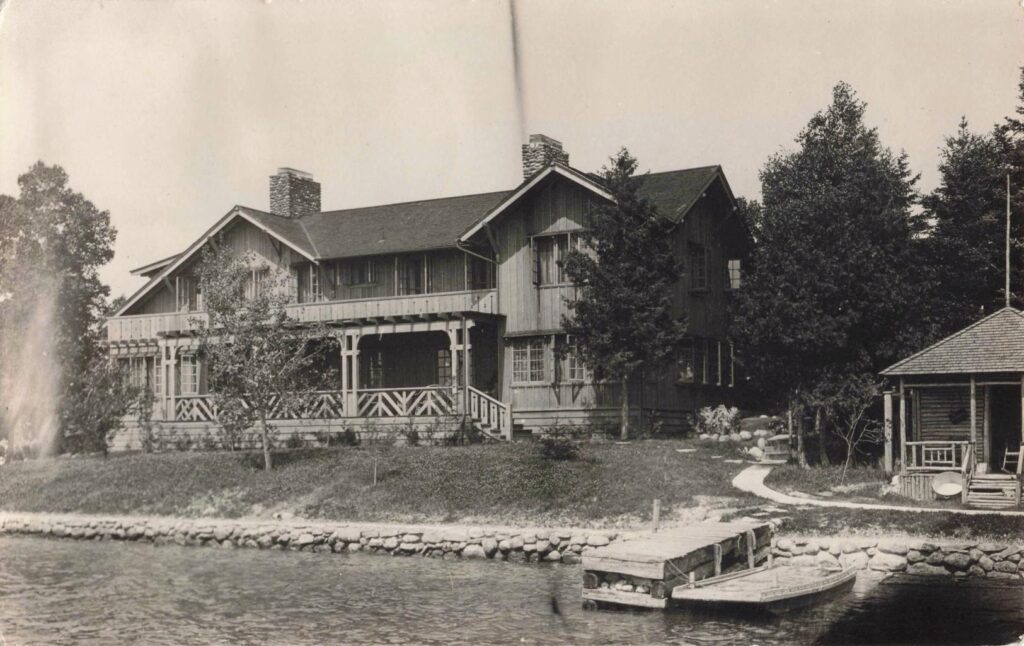
On Michigan’s Lake Huron shore further north, the Les Cheneaux Club is another historic private resort, centered on Marquette Island in the Les Cheneaux Islands archipelago. The club traces its founding to 1888, when a Bay City railroad executive, William L. Benham, acquired land on Marquette Island to create a summer colony.
Together with other prominent businessmen from Bay City, he organized the Les Cheneaux Island Resort Association (soon after renamed Les Cheneaux Club) around 1890.. Their vision was to develop a resort similar to the famous Bay View assembly on Lake Michigan, but in the pristine wilderness of the Upper Peninsula’s Lake Huron shores. By design, the island was platted with small lot clusters along curving lanes, with a large central area reserved for a clubhouse and a dock for access by boat.
In the 1890s, well-to-do families from Chicago, Detroit, and other cities eagerly joined, pitching canvas tents or putting up simple cabins as the first summer shelters.. The community grew quickly: by 1900, Les Cheneaux Club boasted a grand two-story clubhouse/hotel at the center of “Club Point” and roughly 30 private cottages dotted around it, each often with its own boathouse on the shore.
Unique Features of Les Cheneaux Club
The Les Cheneaux Club’s setting is what truly sets it apart – it occupies a portion of an island accessible only by water, surrounded by the sheltered channels (“les cheneaux” in French) of the Lake Huron coast. This geography made boating and sailing a way of life for members. A long community dock welcomed yachts and launch boats, and even today, vintage wooden boats are a common sight (the club’s 1920 boathouse still displays classic boats). On land, the resort provided a wealth of activities: tennis courts and a playground near the clubhouse, and across a narrow channel on an adjacent island, the club laid out a private nine-hole golf course for members’ use. Organized events like fishing excursions, hunting trips, and evening dances were regular occurrences in the early 20th century. The large clubhouse featured dining facilities and lodging rooms, functioning as a social center and hotel for overflow guests. Architecturally, many cottages were built in charming late-Victorian styles – for example, the Shingle-Style McPherson House (built in the 1890s) with its distinctive gabled porch and others with quaint dormers and verandas, all giving the island a storybook village feel.
Historical Significance & Membership at Les Cheneaux Club
The Les Cheneaux Club was one of its era’s premier North Woods resorts, attracting an illustrious membership. In its heyday, it was a summer retreat for families whose names often appeared in society pages – financiers, industrialists, and professionals from the Midwest. One notable figure associated with Les Cheneaux is Aldo Leopold, the famed conservationist. Leopold’s father purchased a cottage on Marquette Island in 1898, and young Aldo spent his boyhood summers exploring the island’s forests and shores. Those formative wilderness experiences at Les Cheneaux helped shape Leopold’s environmental ethos, which later influenced American conservation philosophy. Culturally, the club represents the golden age of Great Lakes resort colonies – a time when travel by steamship and rail allowed urban families to set up seasonal communities in idyllic natural settings. After World War II, like many old resorts, the club saw a decline in lengthy summer-long stays as vacation habits changed. The original clubhouse/hotel eventually disappeared (it was demolished or lost by mid-century). However, the Les Cheneaux Club is still a private entity. Many of the historic cottages remain in the hands of the founding families’ descendants, preserving the club’s heritage.
Membership in Les Cheneaux Club has always been tightly controlled. In the early years, prospective members would buy into the association and lease or own a lot to build a cottage. The club’s charter outlined purposes of “recreation, rest, and the erection of residences and clubhouses” for its members. Emphasizing that it was a member-driven community. Today, there is no public access; only member families and their guests can reach Club Point (typically by private boat from the mainland at Cedarville/Hessel). New membership generally comes only by inheritance or by purchasing an existing cottage – opportunities that are rare. The club has a small governance board and continues to provide services (like maintenance of common areas and docks) for its members. While more low-key now than a century ago, the Les Cheneaux Club remains a living piece of Michigan’s resort history. This insular summer sanctuary still echoes with the genteel spirit of 1890s vacationers.
Continuing Traditions
These resorts along Lake Huron’s Michigan shoreline reflect a rich tradition of private, seasonal communities. Maintaining historical authenticity and exclusivity, Harbor Beach Resort, Pointe aux Barques, and Les Cheneaux Club continue to serve as summer sanctuaries, capturing the essence of Michigan’s resort his
Sources:
- Michigan DNR Historical Marker: Aldo Leopold and Les Cheneaux
- Harbor Beach Resort Association description (LocationsHub)?
- “Those Thursday Places – Harbor Beach Resort Association” – Journey to the Past blog (personal recollections of the resort)?
- “Club House Harbor Beach 1890” – Thumbwind Publications (Michigan’s Thumb history blog)
- Michael Hardy, Thumbwind.com: History of Pointe Aux Barques Cottage Community?
- Pere Marquette Railroad in Harbor Beach – Thumbwind (Harbor Beach Depot history)?
- Kathryn Bishop Eckert, SAH Archipedia: Les Cheneaux Club Subdivision (architectural history)?

